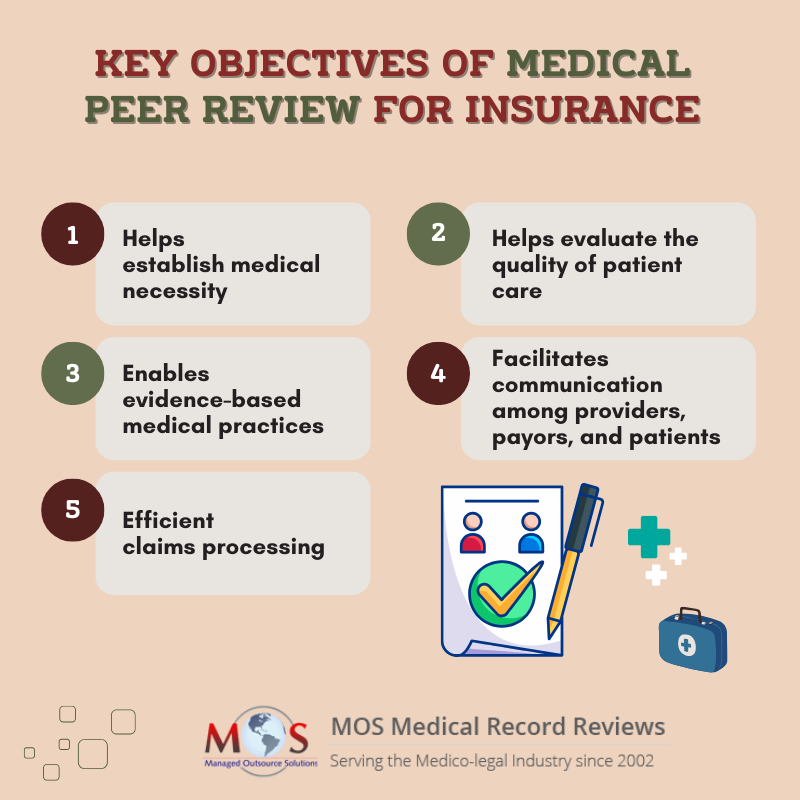Medical peer review for insurance is a key process in the healthcare as well as insurance industries. Its primary objective is to ensure that the medical services provided to patients are necessary, appropriate, and in keeping with established standards of care. Peer review for insurance protects the interests of payors, healthcare providers, as well as plan members. It also plays a significant role in speeding up the settlement of healthcare claims. In this post, we look at the key objectives of insurance peer review and establish its importance in claims processing.
MOS Medical Record Reviews provides timely and accurate medical peer review solutions for insurance attorneys.
Medical Peer Review for Insurance – Key Objectives

- Ensuring that the services provided are medically necessary: It needs to be verified that the medical procedures and treatments are necessary for the patient’s condition. This helps payors prevent fraud and overpayment while also making sure that patients receive appropriate care.
- Assessing the quality of patient care provided: A peer review evaluates the quality of care the patient received, and whether the provider adhered to established standards and clinical guidelines. This is key when it comes to maintaining high standards in patient care and also helps identify areas where improvement is possible for better patient outcomes.
- Enabling evidence-based practices: Since the treatments evaluated are compared against clinical guidelines and patient outcomes, the peer review encourages using evidence-based practices. As a result, it promotes efficient and appropriate treatment protocols that are vital to ensure patient safety and the quality of care.
- Facilitates communication among the different parties involved: Peer review for insurance purposes brings better communication among healthcare providers, patients, and payors. When the communication is transparent, it brings clarity regarding treatment outcomes and what to expect, improves the understanding of treatment protocols adopted, and helps bring quicker resolutions to any disputes.
- Better, speedy and efficient claims processing: The claim evaluation process is standardized and made more efficient. The time taken to review the claims is reduced, and this helps with faster decision-making and settlements.
How Peer Review Helps with Speedy Settlement of Claims
Claims are more quickly settled with a peer review because the claims are systematically evaluated, which facilitates quicker determinations. When the review process is efficient and clear, there is minimum need for back-and-forth communication. Naturally, claim resolution is expedited.
A concise and efficient medical peer review also helps spot any inaccuracies in the claims. This reduces errors, and ensures fewer claim denials and disputes. Claim denials are minimized with proper medical documentation.
Since peer reviews help establish medical necessity and quality standards, it is easier for providers and payers to negotiate settlements. Both sides get comprehensive insights that help make informed decisions and quick settlements. Another important aspect of peer reviews is that they help breed trust among providers, payors and patients. This is key when it comes to collaboration and a dispute-free resolution. With better relationships among all parties, claims processing becomes quick and efficient.
Peer reviews done professionally provide data that helps identify patterns in claims and the efficacy of treatments. This is significant with regard to formulating future policy and procedural improvements. With data-driven insights, process enhancements are ensured that will help streamline claims handling and peer review procedures in the future.
Insurance peer review is thus a very important procedure in claims processing and has many key objectives. Most importantly, it helps ensure medical necessity and the quality of patient care. It helps insurers prevent fraud by promoting evidence-based practices. When the claims processing is enhanced, the settlement process is accelerated, which is beneficial for all stakeholders. A strong peer review system is vital with the healthcare landscape continuing to scale phenomenally. It is the best way to promote the quality of care, accountability, and efficiency in healthcare delivery and insurance claims management.
Contact MOS Medical Record Reviews for speedy and efficient medical peer review services.
Call: 800-670-2809!




